

Positive psychology. Return to Main page.
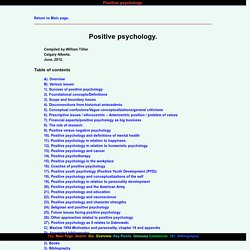
Compiled by William Tillier Calgary Alberta. June, 2012. Table of contents Return to top. PERMA Model - Career Development from MindTools. Bringing Well-Being and Happiness to Your Life Put yourself on the road to happiness. © iStockphoto/silberkorn We all want to be happy.
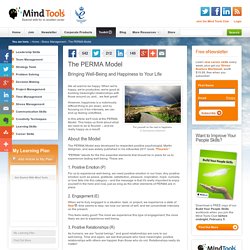
When we're happy, we're productive, we're good at building meaningful relationships with those around us, and... we feel great! Character Strengths and Virtues (book) The strengths and virtues[edit]
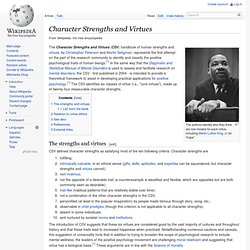
The Happiness Project Toolbox. Happiness Comes From Respect, Not Riches. Money really can’t buy happiness, research shows.
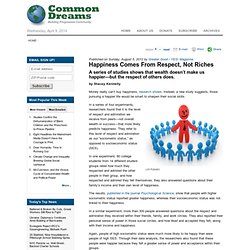
Instead, a new study suggests, those pursuing a happier life would be smart to sharpen their social skills. The Matter-Being Project: Wing Pon » On Positive Psychology & Holon Physiology. This posting derives the Holon Physiology, which contains both the Collapsed Physiology-Psychology at each incarnation together with the Evolved Individual SELF which is connected to each incarnation.
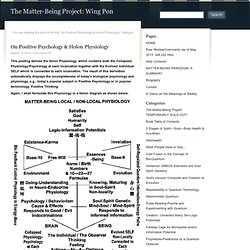
The result of this derivation automatically displays the incompleteness of today’s biological psychology and physiology, e.g., today’s popular subject in Positive Psychology or in popular terminology, Positive Thinking. Again, I shall formulate this Physiology in a Holon diagram as shown below. The details embedded in the above diagram are summarized in the the diagrams shown below.
10 Simple Postures That Boost Performance. Psychological research suggests simple actions can project power, persuade others, increase empathy, boost cognitive performance and more… We tend to think of body language as something that expresses our internal states to the outside world.
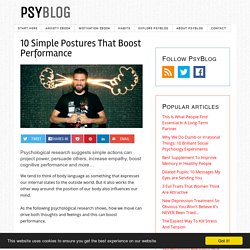
How to Think Like a Genius: 6 steps. Edit Article One Methods:Metaphorming: The Official "Think Like a Genius"® Method There are many ways to classify a genius.

But if you look at the historical figures whom most people would consider geniuses, such as Albert Einstein, Leonardo Da Vinci, and Beethoven, you can see one thing they all share in common: they were all able to think in a way different from the mainstream, and thus made connections that no one else did. Based on that pattern, this article will address some of the ways you can think like a genius. Ad Steps <img alt="Think Like a Genius Step 1 Version 3.jpg" src=" width="670" height="503">1Love learning. Bonheur. Un article de Wikipédia, l'encyclopédie libre. Pour le canard de fiction, voir Gontran Bonheur. Le bonheur se lit sur le visage de cet enfant. World Database of Happiness. Depressive realism. Evidence for[edit] Evidence against[edit] When asked to rate both their performance and the performance of another, non-depressed individuals demonstrated positive bias when rating themselves but no bias when rating others.

Criticism of the evidence[edit] Some have argued that the evidence is not more conclusive because there is no standard for "reality," the diagnoses are dubious, and the results may not apply to the real world.[33] Because many studies rely on self-report of depressive symptoms, the diagnosis of depression in these studies may not be valid as self-reports are known to often be biased, necessitating the use of other objective measures.
Due to most of these studies using designs that do not necessarily approximate real-world phenomena, the external validity of the depressive realism hypothesis is unclear. See also[edit] LA RECHERCHE DU BONHEUR OU L’ATARAXIE. « Je suis bien marri que nous n’ayons une douzaine de Laertius (Diogène Laërce – entre 200 et 500 après J.C. -), ou qu’il ne soit plus étendu ou plus entendu, car je suis pareillement curieux de connaître les fortunes et la vie de ces grands précepteurs du monde, comme de connaître la diversité de leurs dogmes et fantaisies » (Montaigne : Essais II, 10) Lors de la rédaction de mon précédent article : Grandeur et décadence du logos dans la philosophie antique (Ce texte que je conseille vivement de lire ou relire est en ligne sur ce même site), j’ai essayé de montrer comment la raison s’était émancipé du carcan mythologique qui l’étouffait.
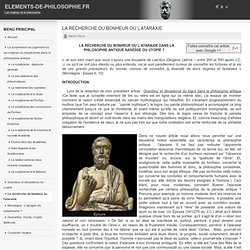
En s’écartant progressivement du muthos (que l’on peut traduire par : “parole mythique”), le logos (ou parole philosophique) a accompagné ce long cheminement jusqu’à ce que la chrétienté, et avant même qu’elle ne soit politiquement triomphante, se soit emparée de ce concept pour l’asservir à son idéologie. Ataraxia. "Ataraxia" (ἀταραξία, "tranquility") is a Greek term used by Pyrrho and Epicurus for a lucid state of robust tranquility, characterized by ongoing freedom from distress and worry.[1] Epicureanism[edit] For Epicureanism, ataraxia was synonymous with the only true happiness possible for a person.

It signifies the state of robust tranquility that derives from eschewing faith in an afterlife, not fearing the gods because they are distant and unconcerned with us, avoiding politics and vexatious people, surrounding oneself with trustworthy and affectionate friends and, most importantly, being an affectionate, virtuous person, worthy of trust. Optimal Functioning - positive psychology & physical health. The Positive Psychology Manifesto was created during the first Akumal meeting in 1999 and revised during the second Akumal meeting in 2000 by the following authors: Ken Sheldon, Barbara Frederickson, Kevin Rathunde, Mihalyi Csikszentmihalyi, and Jonathan Haidt.
Definition of Positive Psychology: “Positive Psychology is the scientific study of optimal human functioning. It aims to discover and promote the factors that allow individuals and communities to thrive. The positive psychology movement represents a new commitment on the part of research psychologists to focus attention upon the sources of psychological health, thereby going beyond prior emphases upon disease and disorder.”
Pp-map.jpg (Image JPEG, 720x1024 pixels) Positive Psychology – In Search Of A Simple Map - Positive Life - Hong Kong » Positive Life - Hong Kong. I spent a few months studying some of the major findings of positive psychology and as I read I found that the literature was predominantly made up of a multitude of research studies without an underlying theory. As I read I started to piece together the jigsaw combining what I was reading with my experience as an educator and counsellor. I began laying out the jigsaw pieces to form a visual map of positive psychology. Below is a recent version… There is so much good material to explore in the Positive Life workshop series.
Positive Psych_Graphic Art_6.13.12.jpg (Image JPEG, 6000x1980 pixels) - Redimensionnée (21%) Signs-you-are-happy-infographic-610x2160.jpg (Image JPEG, 610x2160 pixels) 16 Scientifically-Backed Ways To Boost Your Happiness Almost Instantly (INFOGRAPHIC) Whether you have five minutes to relax or a year to focus on building lasting habits, here are 16 scientifically-backed ways to boost your happiness levels. Go for a run. Physical activity boosts the brain’s release of endorphins, feel-good neurotransmitters that can improve mood and well-being.
Pray. Spirituality and religious involvement is linked with greater well-being and happiness, according to a review of more than 300 studies on the connection between spirituality and health, while prayer is thought to relieve stress. Laugh. Go for a stroll in the park. Perform an act of kindness. Listen to happy music. Using the new Positive Psychology. Martin Seligman: The new era of positive psychology. What makes us happy? Psychologie Positive au Travail. Positive psychology. Category:Positive psychology. "positive psychology" Positive Psychology at Claremont Graduate University. Positive Psychology emerged at the beginning of the new millennium as a movement within psychology aimed at enhancing human strengths such as creativity, joy, flow, responsibility, and optimal performance and achievement.
Most study of human behavior has focused mainly on what goes wrong in human affairs: aggression, mental disease, failure, and so on. While it is essential to study and contain such pathologies, it is equally important to understand those aspects of human experience that make life worth living. The Division of Behavioral and Organizational Sciences (DBOS) at Claremont Graduate University offers the first Ph.D. and M.A. concentrations in the Western United States focused on the Science of Positive Psychology.